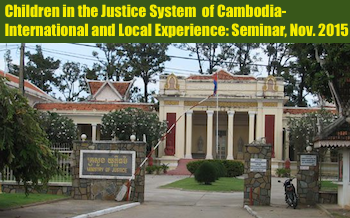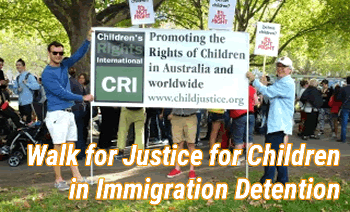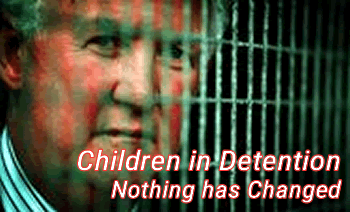In his welcome to readers of CRI's website its Chairman, Alastair Nicholson, acknowledged the United Nations Convention on the Rights of the Child (CRC) as being the most widely ratified treaty in human history, while also noting that the basic rights of children and youth are still not universally recognised and that they suffer violence, abuse, exploitation and discrimination in increasing numbers every day.
As CRI's mission is to promote, protect and advance the human rights of children, primarily in developing countries, and to promote understanding of, adherence to and effective implementation of the CRC it is important that the organization takes a stand on the increasing evidence showing Australia's failure to protect the rights, physical and mental welfare and safety of young asylum seekers, particularly those who have been transferred to offshore detention centres.
Unfortunately, despite Australia being one of the earliest countries to ratify the CRC, its treatment of children and young people has too often failed to comply with the Convention's principles and requirements. Most recently this has been highlighted by the manner in which young asylum seekers, (whether accompanied by family members or unaccompanied), are treated, both in Australia and in the offshore detention centres to which such children have been sent.
See:
Presentation - Professor Louise Newman AM, Monash University, Centre for Developmental Psychiatry and Psycology
For more than 20 years Australia's treatment of asylum seekers, both adults and children, has been the subject of both national and international scrutiny and criticism. Australian Governments from both major political parties have made it increasingly difficult for people fleeing persecution from dangerous circumstances to seek protection in this country. To achieve this end they have over time emphasized the need for border protection at all costs, have incorrectly referred to asylum seekers as being 'illegal' rather than recognizing the legitimacy of their right to seek protection under the Refugee Convention, have altered Australia's borders (thereby deeming Christmas Island to be an offshore centre), introduced provisions to require all undocumented arrivals to be processed offshore, and wrongly accused parents of throwing their children overboard. In 2005 Australia's Migration Act was amended to bring it into line with the Refugee Convention by requiring that children should be detained as a measure of last resort and for the shortest appropriate period of time. However, the reality is that they are still detained, often for indefinite periods , and in environments which are extremely prejudicial to their health and development.
Two major Australian policies which have become the cornerstone of governmental approaches to the treatment of all asylum seekers, regardless of age, are the introduction of mandatory detention in 1992 and the implementation of the Pacific Solution policy in 2001. Although neither has remained in its original form, both have attracted increasing attention from NGOs such as Amnesty, independent government bodies such as the Human Rights Commission, church groups, judges, lawyers and medical practitioners for their draconian characteristics and the harm they cause. The Pacific Solution required undocumented asylum seekers to be sent to Australian-funded offshore detention centres in several Pacific Island States rather than allowing them to seek asylum on the Australian mainland. These centres were closed in late 2007 but re-opened in 2012. They (together with onshore centres and Christmas Island) currently house more than 1,000 minors, although exact numbers and details are hard to establish, as information is rarely released by the government to the public. For centuries families have fled their countries of origin in a desperate attempt to avoid persecution because of their religion, political affiliations, race, nationality, or membership of a particular social group. They travel both singly and with their families by whatever means they can, and many in the past few decades have sought refuge in Australia, despite the dangers they faced in getting here. A frequently cited reason for their arrival is the hope that their children will be able to live in peace and safety to enjoy a freedom that they were unable to grow to adulthood in. Unsurprisingly, many have come from Afghanistan, Iraq, Iran, Sri Lanka and other countries which have been decimated by war, tribal fighting and centuries of targeted persecution. Unsurprisingly also a large proportion of those who have been assessed in Australia have been found to have legitimate claims for asylum once their circumstances have become known.
The situation of these families is deteriorating, as unauthorized arrivals (ie boat people) who arrived in Australia on or after 13 August 2012 are now being processed offshore, due to Australia's outsourcing of the accommodation, security and processing procedures and responsibilities to Nauru and Manus Island. The reintroduction of offshore processing in 2012 included a 'No Advantage' policy, which means that these asylum seekers will have to wait for the same period of time as they would have waited for resettlement had they stayed overseas. Recent reports suggest that offshore centres have yet to even begin such processing, so the waiting period is effectively unknown and of indefinite duration. A recent riot on Manus Island that resulted in the death of an Iranian asylum seeker was allegedly caused by detainees being told they would never be re settled in a third country.
Australia is undeniably a country of affluence, yet it has chosen to fund countries such as Nauru and Papua New Guinea, (which are unable to provide their own citizens with adequate health and educational resources), to care for adults and children in their care. The few individuals who have been permitted to visit Nauru and Manus island give consistent accounts of young asylum seekers being dangerously depressed, lacking educational facilities and medical and psychiatric care, exposed to illnesses such as malaria, witnessing incidents of violence and harming themselves out of desperation. There is virtually no privacy or freedom of movement, detention centres lack security, the children are isolated and bored, and face uncertainty as to their futures, which in turn contributes to them being at serious risk of experiencing mental harm. Many have parents who are also experiencing mental and physical deterioration because of their conditions, which engender a sense of hopelessness.
All are voiceless.
In addition to the problem of who is monitoring the care and welfare of unaccompanied young detainees in the absence of any apparent policy, there is also the question of who their legal guardian is, and thus who may be accountable for a failure to act in their best interests.
In Australia the Minister of Immigration holds that position, in Nauru the Justice Minister does, whilst the situation in Papua New Guinea is unclear.
Very troublesome recent developments have been the decision of the PNG Government, which it claims was taken with Australian Government agreement, to prevent a Judge of the PNG Court inquiring into treatment of asylum seekers at Manus and the complete negation of the rule of law by the Nauru Government in removing the resident magistrate and forcing the resignation of the Chief Justice by preventing him from entering the country.
This appears to have left unaccompanied asylum seeker children without any legal protection as the Australian Minister for Immigration's responsibility as guardian ends once he removes them from Australia. The position of accompanied asylum seeker children appears to be no better because their guardians,, namely their parents, have also been deprived of legal rights and left without any recourse to protect their children. These events in PNG have taken place without any serious opposition from, and very likely with the complicity of, the Australian Government.
The Board of CRI calls on the Australian Government to comply with its international obligations, and particularly with the UN Convention on the Rights of the Child and the UN Refugee Convention, by bringing an end to those policies that are causing such harm to children. More particularly, it is proposing that the Australian Government immediately terminate the policy of offshore mandatory detention of children and their families. In its place, families should be placed in onshore communities, living in conditions which would allow their children to attend local schools and be the recipients of the services available to Australian children of similar ages and stages of development. To do otherwise is contrary to humanity and international norms and cannot be justified by the present populist policies of both major political parties.
The Hon. Alastair Nicholson AO RFD QC
Chair Childrens Rights International
31 March 2014













